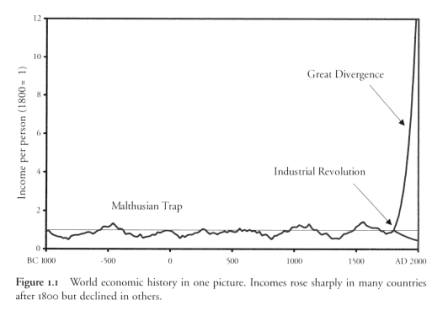Thus an omnibus, poorly-thought-out post.
Paul Krugman posted a
few times on the subject of Malthus, and how his theory has largely been rejected because the two centuries that followed his theory were the only ones on record (out of 60(!) i.e., going back to 4000 B.C.E. or so) in which income gains weren't eaten up by the increase in population. Many attribute this to the magic of capitalism or the magic of the industrial revolution; I, however, would like to hypothesize (based on very little data... scientific method in process!) that this economic boom we call the modern era could have been merely the result the "western world" (which is usually what our extended economic data is based on) discovering another continent to move into, thus easing the pressures of increased population. This would mean that this boom that we attribute to capitalism or industrialism is only temporary, now that we are living in a global economy.
Krugman also points out that the risk of deflation
was and is very real, thus providing some additional justification for deficit stimulus spending in the face of those who would suggest it could cause inflation.
Ed Glaeser, however, points out
some of the disappointments in the stimulus spending on transportation, specifically what a disproportionate amount has gone to fund roads in places that already have plenty of existing roads in comparison to people. Though his point is valid that "mass transit" is typically helpful only where "mass population" already exists, I might like to believe that implementing an actually-useful mass transit system will encourage people to live more densely. At the very least, if that alone does not induce more dense living significantly, I'd prefer we treat the greater efficiency of denser living as a goal and not a mere circumstance with which to reckon.
My own colleague (I use that term charitably*)
Mano Singham posted yesterday on the subject of
the pursuit of happiness, drawing heavily from Vonnegut. I have never formally read any Vonnegut, but every excerpt I come across, every time I hear him speak, I am intrigued and feel as though I've found a kindred spirit. I'd like to remind everyone, however, that Jefferson's inalienable rights were borrowed and subsequently reinterpreted from John Locke, who instead wrote these rights to be "Life, Health, Liberty, and Property." Though it may be more noble to pursue happiness than property (though again, it is worth noting Vonnegut's question of whether happiness can be pursued), I am suspicious of the swapping of one for the other.
The
Mark Sanford movie trailer embedded at the end is also semi-comical, if for only the final line of "Maybe like, five celebrities will die at once and everybody will just forget about it."
Sarah Palin resigned, ha ha, and there are any number of poorly-thought-out (like this post!)
reasons why this might have happened. My favorites are the ones given by
your wonkette, “I’m going to resign because governing a state is hard when you have absolutely no interest in governing a state,” and that given by my dad, which is that she got offered a position commenting for fox news that was to good to pass up.
This was far more comical last night when I read it than it appears to me now; I thus pass along with no further comment except to point out that
per commenter gumplr, the final Lincoln statue does in fact look like
Egon Spengler.
Postscript:
I note that on the holiday celebrating our nation's independence my mind naturally is drawn to the elusivity of pursuing happiness as our founding father suggested and the potential hazards of relying on the effects of this continent's discovery for our well-being. The irony is not lost. Ahhh, holidays.
* - Lest anyone be confused, the charity here is toward myself, or perhaps the nature of the relationship. We are employed by the same school, myself in a far less prestigious position.


